
Theatre text in Flanders anno 2019
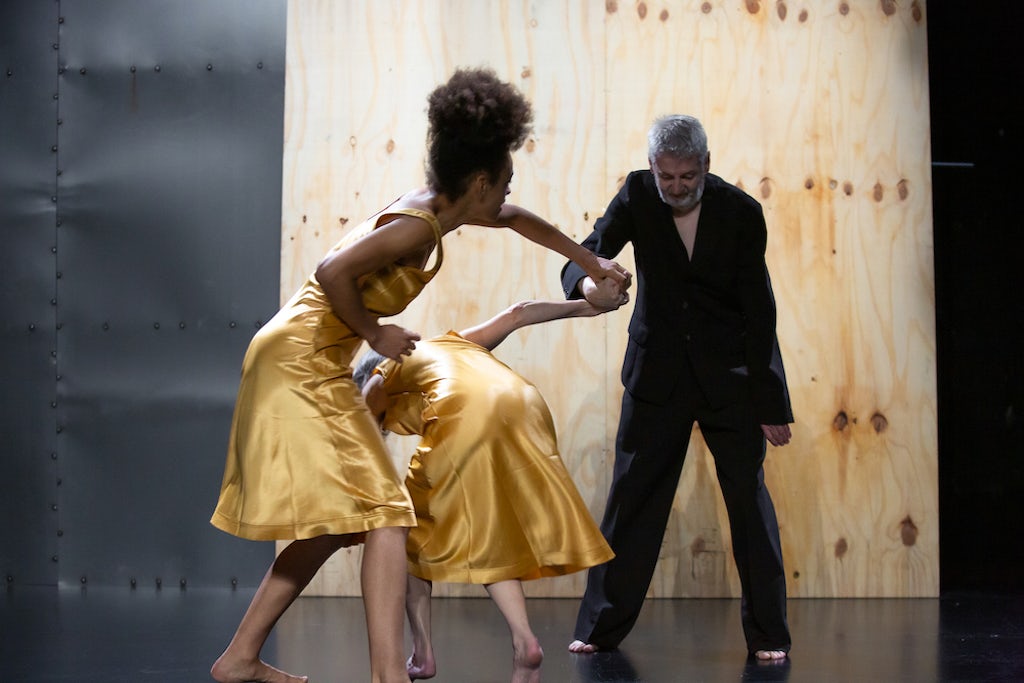
Jan Decorte / Bloet - Body a.k.a (c) Danny Willems
You don’t know what you’re missing. This applies, certainly from an international perspective, to the theatre text in Flanders. It’s likely that an informed theatregoer would be able to spontaneously mention a few choreographers and directors when asked about his or her knowledge of the Flemish performing arts.
Think of Guy Cassiers, Sidi Larbi Cherkaoui, Anne Teresa De Keersmaeker, Ivo van Hove, Luk Perceval and Alain Platel. This list might also include the names of Jan Lauwers and Arne Sierens, who combine writing and directing, even though they may be better known for their productions and less for their texts. How could this be?
The small size of Flanders and the limited reach of the Dutch language fail to explain this. The Norwegian language, spoken by three quarters fewer people than Dutch, does not stop Jon Fosse from being one of the most staged contemporary writers worldwide. The Flemish playwriting art is also not a quantitatively marginal phenomenon. At least 140 people in Flanders are estimated to regularly write for theatre (not including the amateur circuit). For a region with 6.5 million inhabitants, this is not insignificant. Whether or not all 140 want or are able to go through life as a ‘theatre author’ is another discussion, but more about that later. This text attempts to map the current richness and individuality of writing for theatre in Flanders, and tries to explain why appreciation for these texts is not always in proportion.
But first things first. What do we mean when we refer to ‘the theatre text in Flanders’? Is this a geographic description that refers to writing for theatre in the northern part of Belgium, where Dutch is officially spoken? Or does it imply that we are talking about ‘Flemish’ writers, where the term ‘Flemish’ stands for an identity or a language? The latter makes no sense in any case, since Flemish is not recognised as an official language, but is seen as a variation of standard Dutch. Let us agree that within the scope of this text, I understand ‘Flemish’ as follows: authors are considered ‘Flemish’ if they are involved in art events in the Flemish Community.
This de facto certainly makes a difference, both from a historical perspective and with a view to today. The most played Flemish author in the world and until further notice the only Belgian to win the Nobel Prize for Literature, Maurice Maeterlinck (1862-1949), wrote only … in French. This is not surprising given his background as a child of the French-speaking Ghent bourgeoisie. The use of French by the well-to-do class in Flanders was then self- evident. It was not until 1898 that Dutch was recognised as an official language in Belgium.
The Dutch link
The fact that in the year 2019 it is difficult to speak exclusively of authors of ‘Flemish’ origin has to do with a specific form of internationalisation. Thus there are writers from the Netherlands who are an integral part of the Flemish theatre landscape. [1] They were born in the Netherlands and arrived in Flanders through their education or their cooperation with Flemish companies and production houses. Given their qualities as a writer and as a theatre-maker (see below), they all play an important role in Flanders: Suzanne Grotenhuis (°1985), Abke Haring (°1978), Hanneke Paauwe (°1962), Willem de Wolf (°1961), Freek Vielen (°1985), Carly Wijs (°1966) and Rebekka de Wit (°1985).
At the end of 2015, Grotenhuis, Vielen and De Wit took over the artistic management of Toneelproducties De Tijd in Antwerp, which they renamed De NWE Tijd, and which became one of the growing number of young companies that consistently use language and text as the starting point for their work.
Abke Haring was a permanent theatre maker at the Antwerp Toneelhuis from 2010 to 2018. She writes perhaps the most refined texts of the Dutch language area, full of impotence and discomfort. The words that her characters speak settle in the stomach like stones, but at the same time are of immense beauty. Willem de Wolf has been a member of the artistic core of Compagnie de KOE in Antwerp since 2010, and writes texts as part of the collective and as an individual author. Before that, from 1985 to 2004, he formed the Dutch duo Kas & de Wolf together with Ton Kas.
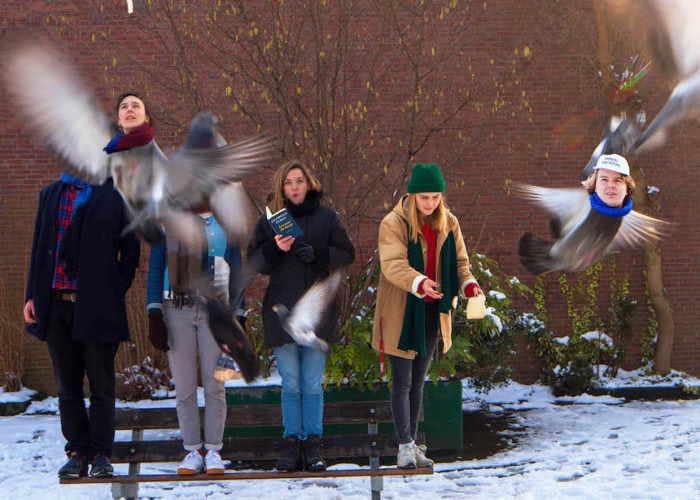
A separate case is the Flemish-Dutch collective BOG., which operates from Antwerp and Amsterdam. BOG. consists of Judith de Joode, Benjamin Moen, Sanne Vanderbruggen and Lisa Verbelen: two Dutch and two Belgians, all born in 1988. BOG. aims to use language, always from different perspectives, as a starting point in order to come to grips with complex phenomena such as ‘life’ or ‘God’. For them, the polyphony is both content and form. The fact that this does not stand in the way of the quality of their writing is a true tour de force. Thus BOG. succeeded in being nominated as a collective in 2013 for the Taalunie Playwright Award, which annually crowns the writer of an original Dutch-language play.
Much has been written over the years about the differences and similarities between Dutch and Flemish theatre, and it is not my intention to summarise that in this text. Even though Flanders and the Netherlands share the same language and there has always been artistic exchange in both directions, the Dutch and Flemish theatrical worlds have developed differently. Thus the Netherlands can boast of a much richer dramatic tradition.
Historical milestones of the order of Joost van den Vondel (1587-1679), P.C. Hooft (1581-1647) or Herman Heijermans (1864-1924) are missing in Flanders. Is this why repertoire theatre is still much more anchored in the Netherlands than in Flanders? There are also differences in the manner of writing.
At a panel discussion for LUCA School of Arts in Leuven, the Dutch publisher Ditte Pelgrom summarised this as follows:
“In the Netherlands, theatre is mainly associated with prose. Situational thinking has been used for a long time. In Belgium it is much more related to poetry.”
Ditte Pelgrom
However generalising, her vision makes sense. In the Netherlands, the language is less sculpted, it is less segregated than in Flanders, it is drier and more businesslike, and as a result also more to the point. [2]
In addition to the exchange of writers between Flanders and the Netherlands, another – more recent – phenomenon can be distinguished. In the wake of contemporary dance, the internationalisation of the performing arts in Flanders also continues elsewhere. In 2017, for example, with the appointment of the Swiss Milo Rau as artistic director of NTGent, someone from outside the Dutch language area was appointed for the first time as head of one of the major Flemish municipal theatres.
Recently, authors have also appeared on the scene whose work is partly produced in Flanders but who do not write in Dutch, for example the Italian Enrica Camporesi (°1985), the Brazilian Luanda Casella (°1975) and the Palestinian Remah Jabr (°1980).
Multilingualism is becoming more and more a reality (also among writers born and raised in Flanders). There are many authors who, for various reasons, write in a language other than Dutch or in several languages at the same time. This is the case among others for Jan Lauwers (°1957), Dounia Mahammed (°1990), Paul Pourveur (°1952) and Tine Van Aerschot (°1961).
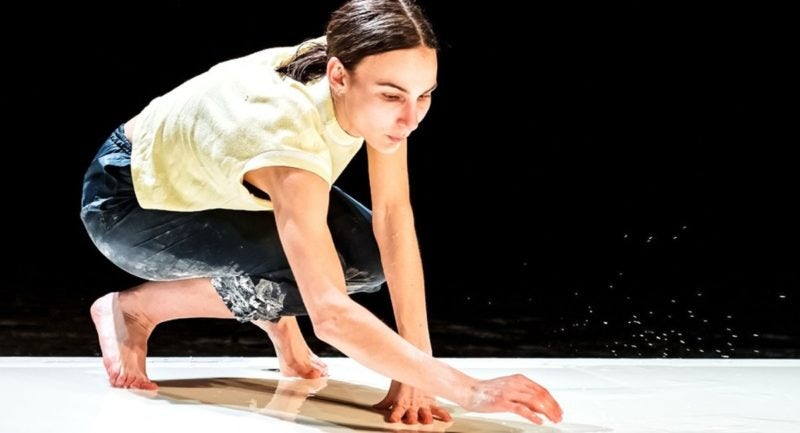
A fertile creative climate
Is the current writing climate in Flanders so inviting that it attracts Dutch and other foreign authors? No, not really. Something else is going on. Rather, there is a ‘creative climate’ in Flanders that attracts theatre makers, also from outside. This incites some to take up writing.
After all, without exception, the foreign writers I just mentioned are authors with the same profile as the majority of autochthon Flemish writers. In essence, they are theatre makers who mainly present and/or direct their own texts. This is the case for about 100 of the 140 authors who write for theatre in Flanders, enough to speak of an essential characteristic of the theatre text in Flanders.
There has never been a Shakespeare, a Molière, a Goethe or a Lope de Vega in Flanders. The only Dutch-speaking Flemish author who is (re)staged with some regularity is Hugo Claus (1929-2008).
This cannot easily be separated from how the theatre in Flanders has evolved through the decades and even through the centuries. Flanders, as I mentioned earlier, cannot fall back on a rich dramatic tradition. The consequences of this are expressed in very different ways. One of these is that original texts by Flemish authors have scarcely become part of the theatre repertoire. There has never been a Shakespeare, a Molière, a Goethe or a Lope de Vega in Flanders. The only Dutch-speaking Flemish author who is (re)staged with some regularity is Hugo Claus (1929-2008).
Current Dutch-language theatre texts do not belong to the canon in Flanders. That is not only a sign of poverty; there are also positive aspects attached to it. Because the weight of the past did not weigh heavily, the generation of Anne Teresa De Keersmaeker and Ivo van Hove operated in a relative vacuum, in which they were able to develop their oeuvre in a strictly personal way.

Although less well documented, the same took place with respect to writing. Those who began to write, often went their own way. The bar for writing was low in this context. Because the author was no longer on a pedestal, the decision to write was sometimes made quickly. Some theatre makers who may not have been ‘born authors’ began writing, simply because it was possible. Sometimes with great success, such as Willy Thomas (°1959), an actor/theatre-maker who wrote one of the reference pieces of this period with B=A in Bubbles (1989).
This mind-set is still present in Flanders today. Characteristic of this is for example the attitude and profile of the training. Unlike in the Netherlands, where a full-time bachelor’s programme in Writing for Performance was set up at the Utrecht School of the Arts (HKU), there is no specialist training for drama writers in Flanders.
There is a specialisation in writing at the Brussels Royal Institute for Theatre, Cinema & Sound, but the emphasis is on scriptwriting for film and television. The four drama programmes in Antwerp, Brussels, Ghent and Leuven do have separate ‘Writing’ courses on the curriculum, but then as part of a programme for … theatre maker. This approach has undoubtedly stimulated recently graduated talent such as Anna Carlier (°1994) and Matthias Van de brul (°1995), but they were not trained in a specific area.
Writer and director Stijn Devillé (°1974) pointed out the great potential of this link between writing and theatre making in the first Flemish ‘State of Theatre Text’, pronounced by himself at deSingel in Antwerp during TheaterFestival 2018.
“Playwrights in Flanders are also almost always theatre makers. Like the greatest playwrights in history. Shakespeare. And Molière. And Chekhov. And Brecht. And Müller. And Claus. They not only know the language. They also know the stage. What I find so wonderful about this is that it combines the best of two worlds: you can lock yourself in your writing room for a while, to dedicate yourself entirely to your research and your writing. I love that solitary activity. But maybe I love even more the moment a few months later, when I can share what is written – with some hesitation – with my actors. Knowing that they will add their talent to it. What a wonderful feeling. (…) The fact that much new dramaturgy in Flanders is created in this way is a great source of richness. It gives the texts depth, nuance, colour, character.”
Despite their major differences, a quality many Flemish theatre authors have is that, through this link, they understand very well what language can accomplish on stage. “Writing is deleting”, is an often-expressed witticism. Flemish theatre authors usually can do this like no other. They are aware that what is not said on stage is often of greater importance than what is said.
Examples of this sparse approach are Jan Decorte (°1950) and Abke Haring. It’s no coincidence that most of their texts are in fact short. Over his career of more than 50 years, Decorte’s writing underwent several phases. Since the beginning of the 90s, however, he has been concentrating almost exclusively on concise versions of classics, which he transforms into his own ‘childish’ language: at first sight playful and naive, even funny, but also razor sharp. Decorte acts in all his pieces: the boundary between himself as a performer and the character he supposedly incarnates is very thin.
What makes this ‘creative climate’ special is that actor/theatre-makers with a talent for writing not only develop the language, but also the specific method that best suits them and/or best meets their personal needs. However important he was for Flemish theatre literature, Claus did not really start a ‘school’. The innovators of the 80s taken together were sometimes labelled the ‘Flemish Wave’, but Flemish equivalents for writing trends such as Theatre of the Absurd or the British in-yer-face theatre are nowhere to be seen.
Flemish critics never felt the urge to capture the diversity present under a single label [3]. The Flemish theatre author was thus given the opportunity to preserve and cherish his or her individuality. Jan Decorte and Filip Vanluchene (°1950), for example, are peers, but their writing has little in common.
Arne Sierens (°1959) initially worked according to the chronology that Stijn Devillé also advocates, but ultimately preferred a long process in which texts arise from a continuous interaction between work on stage, based on improvisation, and work behind the writing table. As a result, the actors breathe through his characters, and vice versa. In this way Sierens succeeds in making the heartbeat of his often colourful characters tangible through the polished language in which they express themselves. Thus in Flanders there are almost as many languages and ways of working as there are writers. A good example of this is Barbara Claes (°1983), who creates her own language constructions, often fantastic in nature, and is inspired in part by art brut.
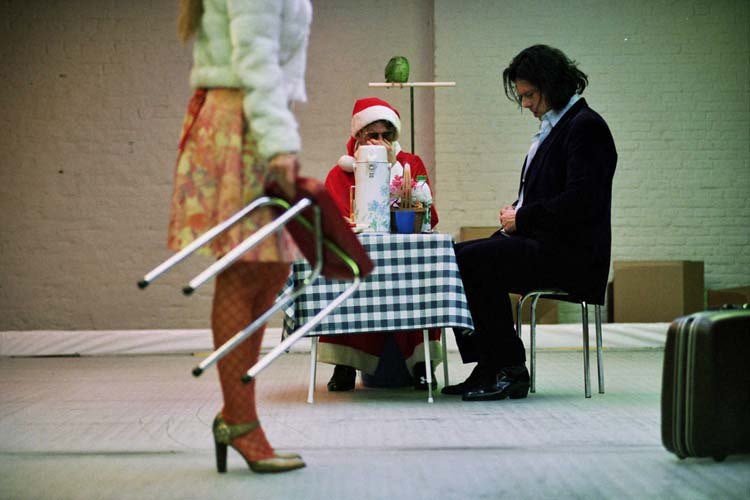
Dramaturge Erwin Jans situates the beginnings of the uniqueness of Flemish dramaturgy at the end of the 1960s and the start of the 1970s. In 2013 and 2014, in the three-part series ‘(N)ooit gelezen? Vlaamse toneelliteratuur’ in the magazine Etcetera, he examined a virtually forgotten period of Flemish theatre writing. In the eyes of Jans, the status of the text in Flemish theatre began to change due to productions that were grafted onto the physical and ritualistic theatre of The Living Theatre and the ‘poor theatre’ of Jerzy Grotowski.
Erwin Jans: “Theatre texts are no longer the start and end point of the theatrical process, but (only) a part of that process. Texts are created within a rehearsal process and often have the status of a script or a scenario instead of an autonomous (literary) text. This is the beginning of the decoupling of drama and literature that will play an important role in the further development of Flemish theatre writing. The autonomy of the writer was abandoned in a number of cases for a collective writing process.”
According to Jans, this tendency continued in the political theatre of the 1970s. “Many of the texts that come about in the context of political theatre are unpublished. They are not striving for a value per se.” [4]
Independent playwrights
In the long term, however, the democratisation of ‘authorship’ in Flanders turned out to be just as much a curse as a blessing. The link with theatre making gave writing for theatre in Flanders its own face, but by reducing autonomy, writing was sometimes also taken less seriously. It was less and less regarded as a craft in itself, and sometimes reduced to a side- effect that was dispatched with quickly between other more important matters. This ‘we prefer to do it ourselves’ approach also carries with it a number of dangers.
The choice for a language is sometimes less focused. It occasionally leads to navel gazing and superficiality. And it is also not true that all who write for theatre are immediately entitled to call themselves a ‘playwright’. That in fact requires a bit more. Those who pen a verse in their diary are not immediately poets. Perhaps due to the need for a sort of counterweight, in the course of the 1990s, especially at large theatre houses, more and more literary authors were asked to write for theatre. Although a minority, they are still there today.
As a result, the type of author who does thrive in the surrounding language areas is scarce in Flanders, namely the ‘independent playwrights’, as Stijn Devillé described them in Antwerp. Independent playwrights write for someone else, or entirely at their own initiative, in the hope that their text will sooner or later be performed. The latter is very rare in Flanders.
In turn, independent playwrights can be subdivided into purebred playwrights and all- rounders who are often poets or prose writers by origin, and who write more or less regularly for theatre, with varying degrees of success. The first category includes Frank Adam (°1968), Paul Pourveur and Filip Vanluchene.
A special mention belongs to possibly the greatest loner among the Flemish playwrights, Bruno Mistiaen (°1960). Mistiaen writes raw, violent, dark comedies according to a classic model. Their titles speak volumes: De papa, de mama en de nazi [The dad, the mommy and the Nazi] (2003), Uw penis [Your penis] (2011), Jezus is een aap [Jesus is a monkey] (2013), Oorlog, seks en hulpverlening [War, sex and assistance] (2014). In Etcetera, Erwin Jans rightly pointed out the relationship between Mistiaen and the in-yer-face theatre that celebrated its heyday in the 1990s.
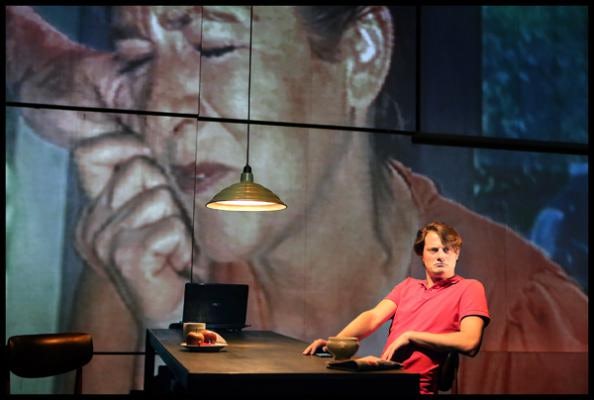
The second category, the all-rounders, includes Fikry El Azzouzi (°1978), Walter van den Broeck (°1941), Bernard Dewulf (°1960), Stefan Hertmans, Tom Lanoye (°1958), Bart Moeyaert (°1964 ), Erwin Mortier (°1965), Jeroen Olyslaegers (°1967), Elvis Peeters (since 1990 the writer’s pseudonym of the couple Jos Verlooy and Nicole Van Bael), David Van Reybrouck (°1971), Peter Terrin (°1968), Annelies Verbeke (°1976) and Erik Vlaminck (°1954).
Peter Verhelst (°1962) does and does not belong on this list. He started as an independent playwright, but developed into a theatre maker at NTGent, to which he was affiliated from 2006 to 2018. The boundaries between the disciplines are in no way relevant to Verhelst. He was the only living Flemish writer to be awarded the most important awards in the field of poetry, prose and drama. His unique poetic universe, represented in a physical, plastic language, finds expression both on and off the stage. Even as a playwright his reach is very broad, from autonomous texts to adaptations of Greek and Elizabethan tragedies.
Only Tom Lanoye spans a similar spectrum. Lanoye’s work, however, is more political, and has been keeping a finger on the pulse of society for the past three decades, even if he chooses the so-called detour of the repertoire. As a solo performer, Lanoye does not shy away from the stage, a quality he pioneered in disciplines that have continued in Flanders in recent years, such as stand-up comedy and the spoken word.
The (vulnerable) position of the writer-maker
With a few exceptions, such as Erik Vlaminck, who is mainly active on behalf of socio-artistic organisations, these independent playwrights write and/or wrote for larger theatre houses, such as the three municipal theatres KVS (Brussels), NTGent and Toneelhuis. Writer/theatre- makers are usually inextricably linked to their own, smaller-scale structure. Which often makes their position vulnerable.
The writer benefits from (or depends on) the context that the theatre maker creates. This requires extra qualities on the part of the maker, management skills for example. Which creates a considerable statutory difference among Flemish writer/theatre-makers. Stijn Devillé, for example, managed to create a fairly stable context for himself in Leuven with his own structures, initially with Braakland/ZheBilding(1997-2015), then with Het nieuwstedelijk since 2015 (the merger betweenBraakland/ZheBilding and theatre-maker group de Queeste).
On the other hand, despite his fame, Peter De Graef (°1958) has been struggling for many years to find his place. Like many young and somewhat ‘older’ professionals, for him it is also a question of continually creating opportunities and scraping things together. At one point his work was produced by his own not-for-profit association vzw Dwama. In recent years he has been working in a privileged relationship with the Dutch MATZER Theaterproducties and the Antwerp music theatre company De Kolonie.
Others, however, fall completely by the wayside. It is difficult for them to ensure their own continuity and build up an oeuvre. The support of the Flemish Literature Fund is essential here. Authors who receive a working grant from the Flemish Fund are able to make time for writing. Due to the intrinsic combination of both, the life of writers and theatre makers is often quite shaky. This is evidenced by the recent fate of, among others, Rudi Meulemans (°1963) and Benjamin Van Tourhout (°1977). When the Flemish government halted the subsidisation of their respective companies De Parade and Toneelgroep NUNC in 2013, this immediately put a mortgage on their writing.
Another consequence is the forced small scale. Many writer/theatre-makers write for a small cast of two or three actors, and often even especially monologues, not because it is necessarily the form they prefer, but because it is economically and productionally feasible. When, however, is a monologue a prosaic narrative, and when is it theatre? This question too sometimes makes the status of the writer/theatre-maker as a playwright dubious. Fortunately, there are a number of artists in Flanders who evade that doubt with gusto. I’ll mention two: Pieter De Buysser (°1972) and Peter De Graef.
De Buysser writes diverse types of texts, but is among others the author of unclassifiable contemporary fairy tales, always brilliantly thought through, relevant and philosophical, with a surrealistic vibe that is very Belgian. De Graef’s monologues have become almost a genre in themself. They are invariably portraits of struggling characters who like to justify themselves. De Graef is also a master of construction. Through seemingly independent thoughts, memories and observations, he ultimately builds coherent stories that mercilessly mislead the audience. De Graef is not afraid to moralise. The commitment present in his work has also increased over the years.
Also worth mentioning as monologues are the diptych Missie [Mission] (2007) and Para [Paratrooper] (2016) by David Van Reybrouck, and Krenz. De gedoodverfde opvolger [Krenz. Next in line of the succession] (2012) by Willem de Wolf. In the two texts, Van Reybrouck gives voice to characters who are often thought of in clichéd terms: the missionary and the paratrooper. Partly based on interviews, both are also characters that are located in the eye of Belgian and world history. Van Reybrouck invites his audience to approach the legacy of a controversial past with as open a mind as possible.
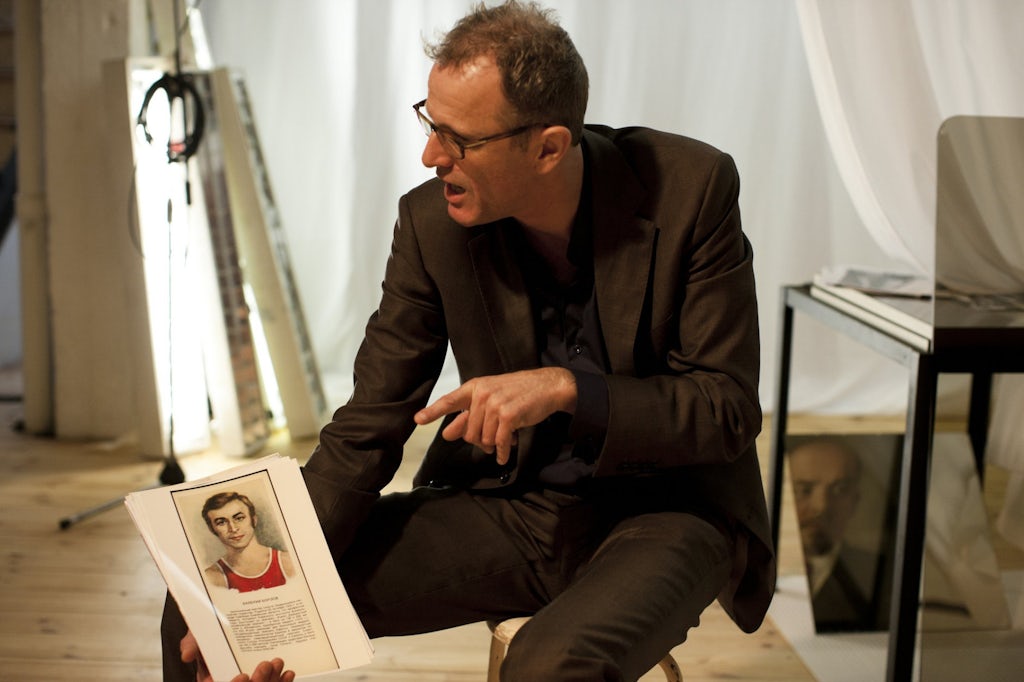
De Wolf too relates to the world in a personal way. Transcending the ego document, he bridges the gap between his own communist youth and Egon Krenz, briefly the political leader of the GDR at the time of the fall of the Berlin Wall. Thanks to the versatility of the form, the monologue also lends itself perfectly to merging with other disciplines, such as music. Pioneering work in this field was done among others by writer/theatre-makers Josse De Pauw (°1952) with weg [path] (1997) and Kris Cuppens (°1962) with Lied [Song] (2005), examples of an open writing style that leaves room for interaction with live musicians on stage.
A recent evolution is the rise of a number of writers who try to combine the best of the worlds I have described above. As theatre makers they are the undisputed engine of their own practice; as writers they at the same time cherish the ambition to deliver autonomous texts that are also assured of a life after their first performance. There is work to be done in this area. Works by current Flemish writers are scarcely staged after their premiere.

In this context, Stijn Devillé stated in his ‘State of the Theatre Text’: “What are the Flemish works of the past ten years that we will take with us into the future? None apparently. The theatre text as disposable item. A second, let alone a third life for a text is almost non-existent.”
Devillé himself has evolved over the past fifteen years as an indefatigable chronicler of the hottest issues of this and the previous century. The topics he touched include the excesses of neoliberalism and the banking crisis (the trilogy Hebzucht, Angst en Hoop [Greed, Fear and Hope], written from 2012 to 2015), terrorism and idealism, high school shootings and the Nuremberg trials (Hitler is dood [Hitler is dead], 2009). Devillés approach is political, almost Brechtian. Although he is co-artistic leader of his own – and therefore limited – structure, Devillé is one of the few contemporary Flemish writers to succeed in regularly writing for a large cast.
Nico Boon (°1978) and Freek Mariën (°1988) also consider themselves autonomous writers with their own practice. Although undeniably authors of the here and now, they each relate in their own way to the generation before them. Like a Jan Decorte or a Willy Thomas, Mariën is fascinated by the materiality of text and language. He also links this to a pronounced political-social dimension. In Wachten en andere heldendaden [Waiting and other heroic acts] (2014) and De schaar van de tsaar [The scissors of the tsar] (2017) he, also for young audiences, goes in search of the inclusion and exclusion mechanisms associated with language.
Boon often creates situational pieces that start from a quite realistic setting, which is a rarity today in writing for the theatre in Flanders. As a researcher and critical thinker, he is also interested in the question of which dramaturgy the world of today needs. What does the legacy of postmodern and post-dramatic writing mean at a time when there is a need for a new social project, free of any form of relativism? What form and content does today’s world require?
The search for another dramaturgy
The connection between dramaturgy and worldview was previously repeatedly identified by Paul Pourveur, perhaps the postmodern Flemish drama writer par excellence. Given the nature of the discipline, according to Pourveur it is the inescapable responsibility of the playwright to connect to the here and now. The title of his work Shakespeare is dead, get over it (2002) is in this sense almost programmatic. In the eyes of Pourveur, the classical repertoire is not up to the task of speaking about today’s world, because it was written from a deterministic worldview that seeks explanations in outdated cause-and-effect relationships.
According to Pourveur, developments in the exact sciences since the end of the nineteenth and the beginning of the twentieth century have sufficiently demonstrated that reality is much more complex. However, this realisation has penetrated theatre only slowly. “Theatre, with its conservatism, defended itself against postmodernism. Not surprisingly. Theatre spends most of its time glorifying the past”, said Pourveur in 1999 in a lecture of which a fragment was printed in the journal Sampel [5].
In his own work, Pourveur consistently gave form to this search for a different dramaturgy. It is striking that in 1999 he saw salvation in the essay, much more than in the story, to give shape to this reality. According to Pourveur: “Since reality can no longer be grasped and the only thing that can be described is a probability, the essay in my opinion is the only possible way to represent that probability. An essay tries to prove something and is never an indisputable fact. An essay challenges the audience, tries to initiate a thought process – to itself reach an opinion about a particular theme.”
Pourveur’s words are visionary in the sense that theatrical writing in Flanders has in recent years partly developed in the direction that he advocated in 1999. The polyphony I mentioned earlier with regard to BOG., which can also be found at De NWE Tijd and Hof van Eede, exhibits essayistic aspects. The Ghent collective Hof van Eede consists of Ans Van den Eede (°1986), Louise Van den Eede (°1985) and Wannes Gyselinck (°1980).
Like BOG., they succeed in writing coherent, meaningful texts as a collective. Vanish Beach (2017) is based on the life of the many German and Austrian artists and intellectuals who came to California in the run-up to the Second World War. Hof van Eede introduces five characters who express as many different perspectives on topics such as migration and exile. Like De NWE Tijd, Hof van Eede connects personal thoughts and beliefs with solid observations and analyses of people and the world. The result is not dry essayistics, but playful and lively.
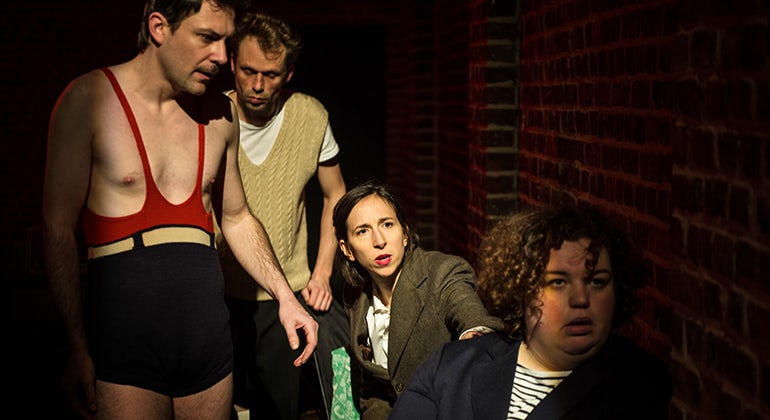
Renewed attention and visibility
The ambitions of writers such as Stijn Devillé, Nico Boon and Freek Mariën are supported by the renewed interest in the publication of theatre texts. Not that the big publishing houses are demonstrating much commitment in this area. Except for the output of a few established names such as Stefan Hertmans and Tom Lanoye, who can fall back on their own publishing house, most Flemish theatre texts – if they are published at all – are handled by two small publishers.
Bebuquin in Antwerp was founded in 1994 by writer Bart Meuleman and writer/illustrator Paul Verrept, and was initially active until 2003. After a period of inactivity, it was reborn in 2010 under the impulse of theatre journalist Wouter Hillaert, critic/dramaturge Esther Severi and co-founder Verrept himself. Bebuquin has about sixty publications to its name. De Nieuwe Toneelbibliotheek was established in Amsterdam in 2009 at the initiative of five people, with editor Ditte Pelgrom and designer Connie Nijman still the pivotal figures today.
De Nieuwe Toneelbibliotheek covers both the Netherlands and Flanders. It has published almost 500 books, of which one hundred can be considered part of ‘Flemish’ theatre. De Nieuwe Toneelbibliotheek is not a traditional publisher, but operates with the financial support of writers and companies, and is intentionally cost-friendly. In addition to information about the writers, De Nieuwe Toneelbibliotheek also makes texts available online. While it is sometimes difficult to find a theatre department even in the better independent Flemish book stores, Bebuquin and De Nieuwe Toneelbibliotheek have done wonders for the visibility of the theatre text in Flanders.
Partly because of the rise of collectives such as BOG., De NWE Tijd and Hof van Eede, a number of theatre critics have recently been alluding to a ‘return’ of the theatre author in Flanders. Hence the title of Evelyne Coussens’ article in the newspaper De Morgen of 14 January 2018: “Doodverklaard en toch weer springlevend: de theaterauteur” [Declared dead yet again alive and kicking: The theatre author].
It is my conviction, however, that this author had never really gone away. At most, he/she was pushed to the margins at a certain moment, and it is the merit among others of Bebuquin and De Nieuwe Toneelbibliotheekthat his/her visibility has again increased. In my view it is no coincidence that promising authors such as Leen Roels (°1983) and Leen Verheyen (°1984), who debuted in the theatre in Flanders precisely at the time that neither De Nieuwe Toneelbibliotheek nor Bebuquin were active, had an extra hard time establishing their name. Work that is not published in any way is not archived, and is simply not available.
Which brings me to the place of the text in the current Flemish theatre establishment. In my opinion it never prevented born authors from writing, but I agree with Evelyne Coussens when she writes that in the not so distant past of the theatre, the text in Flanders was ‘very uncool’. In today’s visual society, text theatre is sometimes perceived as difficult or even old- fashioned. Much more visual and physical work is being made today than a few years ago, especially for a young audience. The question is whether you follow this trend as an artist or company, or whether you use the medium precisely to provide a form of pushback.
Many writer/theatre-makers who have emerged in Flanders in the past decade, consciously choose the latter. Collectives such as BOG., De NWE Tijd and Hof van Eede, but also individual writer/theatre-makers, are not at all unworldly. On the contrary, they are consistently looking for the strength and the nuance that words, despite their imperfections, are still able to project. In this way they contribute to the richness of a writing field that does not always receive the attention it deserves.
Footnotes
[1] The reverse is also taking place. Lucas De Man (°1982), Sarah Ringoet (°1977) and Joachim Robbrecht (°1979) are active almost exclusively in the Netherlands and, although of Flemish origin, are more often considered to be part of Dutch theatre.
[2] An interesting case in point, even eighteen years after the fact, concerns the reception of Mind the Gap by Stefan Hertmans (°1951), a text that premièred in 2001 in a co-production by Toneelgroep Amsterdam and the Brussels Kaaitheater, directed by Gerardjan Rijnders. Flemish critics were full of praise, and the Dutch critique devastating, for this radical reworking of three classical Greek tragedies in which past and present, reality and illusion, the collective and the individual continuously merge. In the Dutch magazine Theatermaker, Hertmans explained this with the observation that Flemish theatre is much more permeated by the legacy of post- modernism than is Dutch theatre. While some find it difficult to accept, this is still the case today. It is also evident from the varying appreciation for a historical author like the German Heiner Müller (1929-1995): while he was embraced in Flanders in the 80s and 90s, he was treated with just as much suspicion in the Netherlands.
[3] This did take place in Great Britain, where critic Aleks Sierz in 2001 brought writers as diverse as Sarah Kane and Mark Ravenhill together in the in-yer-face theatre; artists themselves often abhor these types of labels.
[4] Jans, Erwin: “(N)ooit gelezen? Vlaamse toneelliteratuur 1970-1980” [(N) ever read? Flemish theatre literature 1970-1980]. In Etcetera no. 137, 15 June 2014.
[5] Pourveur, Paul: “De kat die tegelijk dood en levend was” [The cat that was dead and alive at the same time]. In:Sampel, volume eight, no. 2, June 1999.
About the author
Peter Anthonissen has been associated with fABULEUS (Leuven) as dramaturge since 2006. In the Netherlands he works as freelance dramaturge for Theater Artemis and Hoge Fronten. He also teaches drama and the jazz/light music specialisation at LUCA School of Arts in Leuven (Lemmens Campus).





